- Home
- Truman Capote
Other Voices, Other Rooms Page 17
Other Voices, Other Rooms Read online
Page 17
Joel plugged his ears; what Zoo said was ugly, he was sick-sorry she’d ever come back, she ought to be punished. “Stop that, Zoo,” he said, “I won’t listen, I wont . . .” but Zoo’s lips quivered, her eyes blindly twisted toward the inner vision; and in the roar of silence she was a pantomime: the joy of Jesus demented her face and glittered like a sweat, like a preacher her finger shook the air, agonies of joy jerked her breast, her lips bared for a lowdown shout: in sucked her guts, wide swung her arms embracing the eternal: she was a cross, she was crucified. He saw without hearing, and it was more terrible for that, and after she’d gone, docilely taking the broth bowl with her, he kept his fingers in his ears till the ringing grew so loud it deafened even the memory of sound.
They were sure John Brown would never make it up the hill: “If he simply lay down and rolled over on us, I wouldn’t blame him,” said Randolph, and Joel tightened his muscles, hoping this might make the mule’s load lighter. They had a croquer sack for saddle and rope for reins, nevertheless they managed to stay astride, though Randolph wobbled perilously, grunting all the while, and eating endless hard-boiled eggs which Joel handed him from a picnic basket he held. “Another egg, my dear, I’m feeling most frightfully seasick again: if you feel something coming up always put something down.”
It was a smoky day, the sky like a rained-on tinroof, the sun, when you saw it, fishbelly pale, and Joel, who had been routed out of bed and rushed away with such inconsiderate haste, he’d not had time in which to dress decently, was goosepimpled with cold, for he wore a thin T-shirt (turned inside out), and a pair of summer knickers with most of the buttons busted off the fly. At least he had on regular shoes, whereas Randolph wore only carpet slippers. “My feet have expanded so ominously it’s all I can do to squeeze them into these; really, in the light of day what a ghoul I must look: I have the damnedest sensation that every time this sad beast moves my hair falls in floods, and my eyes: are they spinning like dice? Of course I reek of moth-balls . . .” The suit he wore gave off their odor like a gas; a shrunken linen suit stiff with starch and ironed shiny, it bulged and creaked like medieval armor, and he handled himself with exaggerated gingerness, for the seams kept announcing bawdy intentions.
Toward twelve they dismounted, and spread their picnic under a tree. Randolph had brought along a fruit-jar of scuppernong wine; he gargled it like mouthwash, and when there was no more, Joel made use of the empty jar to trap ants: The Pious Insect, Randolph called them, and said: “They fill me with oh so much admiration and ah so much gloom: such puritan spirit in their mindless march of Godly industry, but can so anti-individual a government admit the poetry of what is past understanding? Certainly the man who refused to carry his crumb would find assassins on his trail, and doom in every smile. As for me, I prefer the solitary mole: he is no rose dependent upon thorn and root, nor ant whose time of being is organized by the unalterable herd: sightless, he goes his separate way, knowing truth and freedom are attitudes of the spirit.” He smoothed his hair, and laughed: at himself, it seemed. “If I were as wise as the mole, if I were free and equal, then what an admirable whorehouse I should be the Madame of; more likely, though, I would end up just Mrs Nobody in Particular, a dumpy corsetless creature with a brickhead husband and stepladder brats and a pot of stew on the stove.” Hurriedly, as if bringing an important message, an ant climbed up his neck, and disappeared into his ear. “There’s an ant inside your head,” said Joel, but Randolph, with the briefest nod, went on talking. So Joel cuddled up to him and, politely as he could, peered into his ear. The idea of an ant swimming inside a human head so enthralled him that it was some while before he became aware of silence, and the tense prolonged asking of Randolph’s eyes: it was a look which made Joel prickle mysteriously. “I was looking for the ant,” he said. “It went inside your ear; that could be dangerous, I mean, like swallowing a pin.”
“Or defeat,” said Randolph, his face sinking into sugary folds of resignation.
The gentle jog of John Brown’s trot set ajar the brittle woods; sycamores released their spice-brown leaves in a rain of October: like veins dappled trails veered through storms of showering yellow; perched on dying towers of jack-in-the-pulpit cranberry beetles sang of their approach, and tree-toads, no bigger than dewdrops, skipped and shrilled, relaying the news through the light that was dusk all day. They followed the remnants of a road down which once had spun the wheels of lacquered carriages carrying verbena-scented ladies who twittered like linnets in the shade of parasols, and leathery cotton-rich gentlemen gruffing at each other through a violet haze of Havana smoke, and their children, prim little girls with mint crushed in their handkerchiefs, and boys with mean blackberry eyes, little boys who sent their sisters screaming with tales of roaring tigers. Gusts of autumn, exhaling through the inheriting weeds, grieved for the cruel velvet children and their virile bearded fathers: Was, said the weeds, Gone, said the sky, Dead, said the woods, but the full laments of history were left to the Whippoorwill.
As seagulls inform the sailor of land’s nearness, so a twist of smoke unfurling beyond a range of pines announced the Cloud Hotel. John Brown’s hoofs made a sucking sound in the swamp mud as they circled the green shores of Drownin Pond: Joel looked over the water, hoping to glimpse the creole or the gambler; alas, those sly and slimy fellows did not show themselves. But anchored off shore was a bent, man-shaped tree with moss streaming from its crown like scarecrow hair; sunset birds, hullabalooing around this island roost, detonated the desolate scene with cheerless cries, and only catfish bubbles ruffled the level eel-like slickness of the pond: in a burst, like the screaming of the birds, Joel heard the lovely laughing splashful girls splashing diamond fountains, the lovely harp-voiced girls, silent now, gone to the arms of their lovers, the creole and the gambler.
The hotel rose before them like a mound of bones; a widow’s-walk steepled the roof, and leaning over its fence was Little Sunshine, who had a telescope trained upon the path; as they came closer he began a furious gesturing which at first seemed a too frantic welcome, but as his frenzy dissipated not at all, they soon realized he was warning them off. Curbing John Brown, they waited in the seeping twilight while the hermit descended through the trapdoor of the widow’s-walk, presently reappearing on a slide of steps which tinkled over wastes of feudal lawn down to the water’s rim. Brandishing his hickory cane, he advanced along the shore with a creeping bowlegged hobble, and Joel’s eyes played a trick: he saw Little Sunshine as the old pond-tree come alive.
Still yards away, the hermit stopped and, stooping on his cane, fixed them with a gluey stare. Then Randolph said his name, and the old man, blinking with disbelief, broke into frisky giggles: “Well, now, ain’t you the mischief! Can’t see worth nothin, an there I was with my ol spyglass axin: who that a-comin where they ain’t got no place? Well, now, this be a sweet todo! Step-long, step-long, follow me right careful, plenty quicksand.”
They walked single-file, Joel, who led the mule, going last, and wondering, as he followed the sog of Randolph’s footprints, why he’d been lied to, for it was plain that Little Sunshine had not been expecting them.
Swan stairs soft with mildewed carpet curved upward from the hotel’s lobby; the diabolic tongue of a cuckoo bird, protruding out of a wall-clock, mutely proclaimed an hour forty years before, and on the room clerk’s splintery desk stood dehydrated specimens of potted palm. After tying a spittoon onto John Brown’s leg, this in order that they could hear him should he wander off, they left him in the lobby, and filed through the ballroom, where a fallen chandelier jeweled the dust, and weather-ripped draperies lay bunched on the waltz-waved floor like curtsying ladies. Passing a piano, over which web was woven like the gauzy covering of a museum exhibit, Joel struck the keys expecting “Chopsticks” in return; instead, there came a glassy rattle of scuttling feet.
Beyond the ballroom, and in what had once been Mrs Cloud’s private apartment, were two simply furnished, spacious rooms, both beautifully clean, an
d this was where Little Sunshine lived: the evident pride he took in these quarters increased the charm of their surprise, and when he closed the door he made nonexistent the ruin surrounding them. Firelight polished sherry-red wood, gilded the wings of a carved angel, and the hermit, bringing forth a bottle of homemade whiskey, put it where the light could lace its comforting promise. “It is been a mighty long while since you come here, Mister Randolph,” he said, drawing chairs about the fire. “You was justa child, like this sweet boy.” He pinched Joel’s cheek, and his fingernails were so long they nearly broke the skin. “Usta come here totin them drawin books; I wisht you’d come again like that.” Randolph inclined his face toward the shadows of his chair: “How silly, my dear; don’t you know that if I came here as a child, then most of me never left? I’ve always been, so to speak, a non-paying guest. At least I hope so, I should so dislike thinking I’d left myself somewhere else.” Joel slumped like a dog on the floor before the hearth, and the hermit handed him a pillow for his head; all day, after the weeks in bed, it had been as if he were bucking a whirlpool, and now, lullabyed to the bone with drowsy warmth, he let go, let the rivering fire sweep him over its fall; in the eyelid-blue betweenness the wordy sounds of the whiskey-drinkers spilled distantly: more distinct and real were whisperings behind the walls, above the ceiling: rotate of party slippers answering a violin’s demand, and the children passing to and fro, their footsteps linking in a dance, and up and down the stairs going-coming humming heel-clatter of chattering girls, and rolling broken beads, busted pearls, the bored snores of fat fathers, and the lilt of fans tapped in tune and the murmur of gloved hands as the musicians, like bridegrooms in their angel-cake costumes, rise to take a bow. (He looked into the fire, longing to see their faces as well, and the flames erupted an embryo; a veined, vacillating shape, its features formed slowly, and even when complete staved veiled in dazzle: his eyes burned tar-hot as he brought them nearer: tell me, tell me, who are you? are you someone I know? are you dead? are you my friend? do you love me? But the painted, disembodied head remained unborn beyond its mask, and gave no clue. Are you someone I am looking for? he asked, not knowing whom he meant, but certain that for him there must be such a person, just as there was for everybody else: Randolph with his almanac, Miss Wisteria and her search by flashlight, Little Sunshine remembering other voices, other rooms, all of them remembering, or never having known. And Joel drew back. If he recognized the figure in the fire, then what ever would he find to take its place? It was easier not to know, better holding heaven in your hand like a butterfly that is not there at all.) Goodnight ladies, sweet dreams ladies, farewell ladies, we’re going to leave you now! Farewell sighs of folding fans, the brute fall of male boots, and the furtive steps of tittering Negro girls tiptoeing through the vast honeycomb snuffing candles and drawing shades against the night: echoes of the orchestra strum a house of sleep.
Then over the floors an unearthly clangclang dragging commenced, and Joel, wide-eyed at this uproar, turned to the others; they’d heard it, too. Randolph, flushed with whiskey and talk, frowned and put down his glass. “It be the mule,” said Little Sunshine with an inebriated giggle, “he out there walkin round.” And Joel recalled the spittoon they’d tied to John Brown’s leg: it banged on the stairs, seemed to pass overhead, become remote, grow near.
“How’d he get up yonder?” said the hermit, worried now. “Ain’t no place for him to be: damn fool gonna kill hisself.” He held a hunk of kindling in the fire. Using it as a torch, he stumbled out into the ballroom. Joel tagged bravely after him. But Randolph was too drunk to move.
Around the torch swooped white choirs of singing wings which made to leap and sway all within range of the furious light: humped greyhounds hurtled through the halls, their silent shadow-feet trampling flowerbeds of spiders, and in the lobby lizards loomed like dinosaurs; the coral-tongued cuckoo bird, forever stilled at three o’clock, spread wings hawk-wide, falcon-fierce.
They halted at the foot of the stairs. The mule was nowhere to be seen: the banging of the telltale spittoon had stopped. “John Brown . . . John Brown,” Joel’s voice enlarged the quiet: he shivered to think that in every room some sleepless something listened. Little Sunshine held his torch higher, and brought into view a balcony which overlooked the lobby: there, iron-stiff and still, stood the mule. “You hear me, suh, come down offen there!” commanded the hermit, and John Brown reared back, snorted, pawed the floor; then, as if insane with terror, he came at a gallop, and lunged, splintering the balcony’s rail. Joel primed himself for a crash which never came; when he looked again, the mule, hung to a beam by the rope-reins twisted about his neck, was swinging in mid-air, and his big lamplike eyes, lit by the torch’s blaze, were golden with death’s impossible face, the figure in the fire.
Morning collected in the room, exposing a quilt-wrapped bundle huddled in a corner: Little Sunshine, sound asleep. “Don’t wake him,” whispered Randolph who, in rising, knocked over three empty whiskey bottles. But the hermit did not stir. As they crept out through the hotel Joel closed his eyes, and let Randolph lead him, for he did not want to see the mule: a sharp intake of breath was Randolph’s only comment, and never once did he refer to the accident, nor ask a question: it was as if from the outset they’d planned to return to the Landing on foot. The morning was like a slate clean for any future, and it was as though an end had come, as if all that had been before had turned into a bird, and flown there to the island tree: a crazy elation caught hold of Joel, he ran, he zigzagged, he sang, he was in love, he caught a little tree-toad because he loved it and because he loved it he set it free, watched it bounce, bound like the immense leaping of his heart; he hugged himself, alive and glad, and socked the air, butted like a goat, hid behind a bush, jumped out: Boo! “Look, Randolph,” he said, folding a turban of moss about his head, “look, who am I?”
But Randolph would have no part of him. His mouth was set in a queer, grim way. As if he walked the deck of a tossing ship, he lurched forward, leaning from side to side, and his eyes, raw with bloodshot, acted as a poor compass, for he seemed not to know in which direction he was going.
“I am me,” Joel whooped. “I am Joel, we are the same people.” And he looked about for a tree to climb: he would go right to the very top, and there, midway to heaven, he would spread his arms and claim the world. Running far ahead of Randolph, he shinnied up a birch, but when he reached the middle branches, he clasped the trunk of the tree, suddenly dizzy; from this altitude he looked back and saw Randolph, who was walking in a circle, his hands stretched before him as if he were playing blind man’s bluff: his carpet slippers fell off, but he did not notice; now and then he shook himself, like a wet animal. And Joel thought of the ant. Hadn’t he warned him? Hadn’t he told him it was dangerous? Or was it only corn whiskey swimming in his head? Except Randolph was being so quiet. And drunk folks were never quiet. It was peculiar. It was as though Randolph were in a trance of some kind.
And Joel realized then the truth; he saw how helpless Randolph was: more paralyzed than Mr Sansom, more childlike than Miss Wisteria, what else could he do, once outside and alone, but describe a circle, the zero of his nothingness? Joel slipped down from the tree; he had not made the top, but it did not matter, for he knew who he was, he knew that he was strong.
He puzzled out the rest of the way back to the Landing the best way he could. Randolph did not say a word. Twice he fell down, and sat there on the ground, solemn and baby-eyed, until Joel helped him up. Another time he walked straight into an old stump: after that, Joel took hold of his coat-tail and steered him.
Long, like a cathedral aisle, and weighted with murky leaf-light, a path appeared, then a landmark: Toby, Killed by the Cat. Passing the moon tree, beneath which Jesus Fever was buried, no sign marking his grave, they came upon the Landing from the rear, and entered the garden.

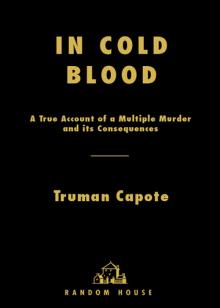 In Cold Blood
In Cold Blood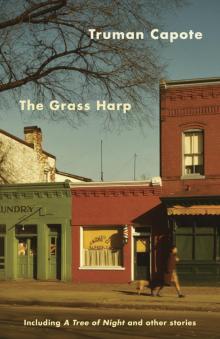 The Grass Harp, Including a Tree of Night and Other Stories
The Grass Harp, Including a Tree of Night and Other Stories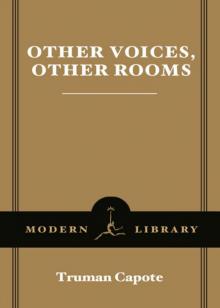 Other Voices, Other Rooms
Other Voices, Other Rooms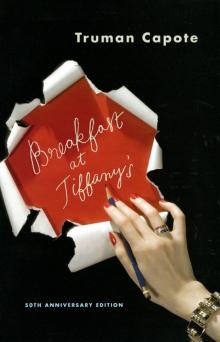 Breakfast at Tiffany's
Breakfast at Tiffany's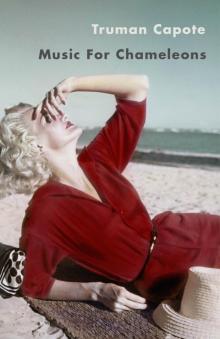 Music For Chameleons
Music For Chameleons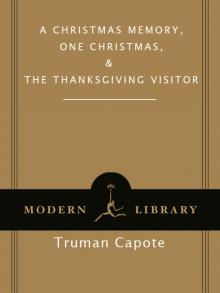 A Christmas Memory, Including One Christmas and the Thanksgiving Visitor
A Christmas Memory, Including One Christmas and the Thanksgiving Visitor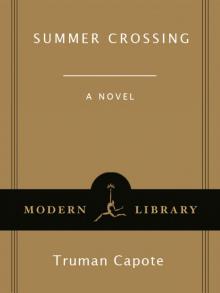 Summer Crossing
Summer Crossing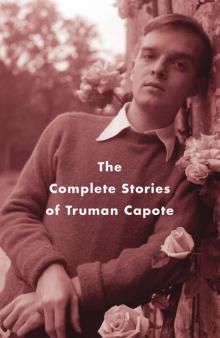 The Complete Stories of Truman Capote
The Complete Stories of Truman Capote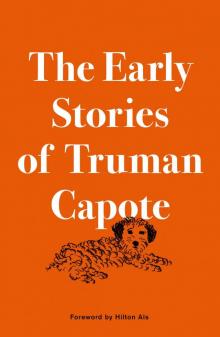 The Early Stories of Truman Capote
The Early Stories of Truman Capote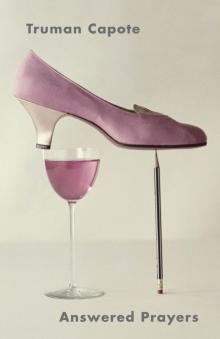 Answered Prayers
Answered Prayers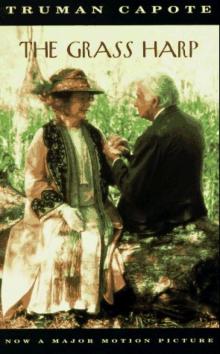 The Grass Harp
The Grass Harp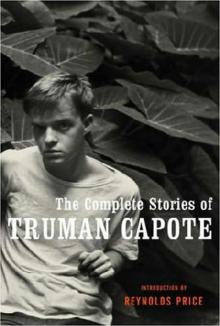 SSC (2004) The Complete Stories of Truman Capote
SSC (2004) The Complete Stories of Truman Capote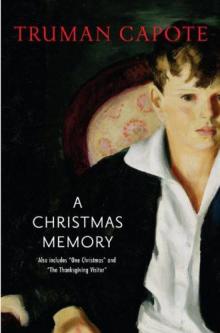 A Christmas Memory
A Christmas Memory